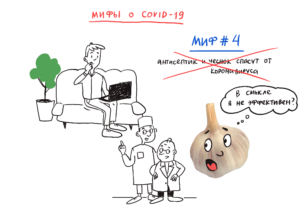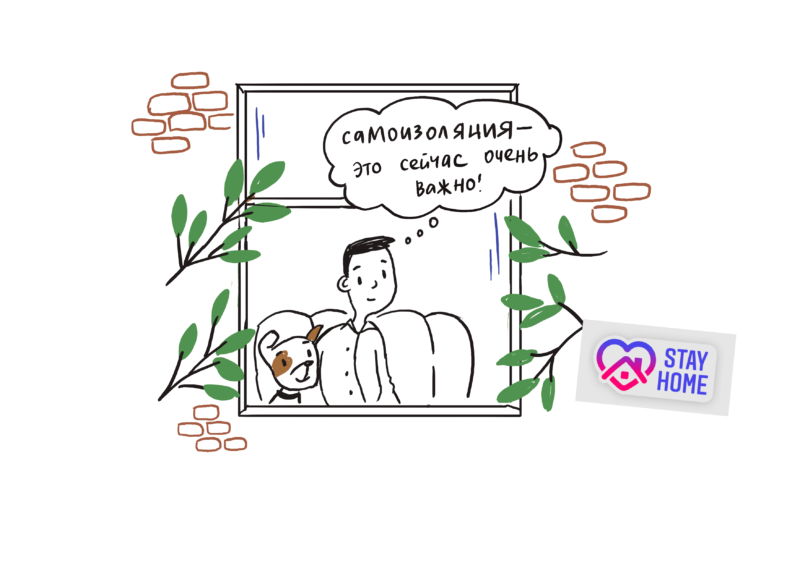The COVID-19 Infodemic
The World Health Organization (WHO) has repeatedly stated, the COVID-19 outbreak and response has been accompanied by a large-scale ‘infodemic’ (derives from the words ‘information’ and ‘pandemic’).
‘Infodemic’ – an over-abundance of information, often inaccurate and incorrect, – not only makes it hard for people tо find scientifically sound information about COVID-19, but also poses serious health risks to those who have already faced the COVID-19 infection or look for reliable guidance to protect themselves from it.
To answer the common misconceptions associated with the COVID-19 pandemic, WHO has launched a special section “Myth busters” on its official page. It explains, for example, why drinking alcohol does not protect against COVID-19 or why Ultra-violet (UV) lamps should not be used to disinfect hands.
Sorting the COVID-19 facts from the fakes: popular science video for young people in EECA region
To make the reliable information about coronavirus and proper preventive measures more accessible for young people in Eastern Europe and Central Asia, the UNESCO Institute for Information Technologies in Education (UNESCO IITE) and the popular science Youtube channel “Nowchpok” released an animated video “Sorting the COVID-19 facts from the fakes” (in Russian, with English subtitles).
The authors of the video analyzed 8 common myths about coronavirus that are currently being distributed through social media and other networks. Should they use antibiotics as prophylactic agent against coronavirus? Will warm weather stop the outbreak of COVID-19? Should young girls and boys (being imprudently considered as “non-risk” groups) self-isolate?


Stills from “Sorting the COVID-19 facts from the fakes” video
More than 370 thousand viewers have already watched the video, and more than 27 thousand – have also marked it as “Liked” one.

“Thank you! I’ll better show this to my parents so that they do not bother anymore… Hope, they will consider the information provided in the video.”

“There is no vaccine from COVID-19 yet. Nonetheless, how could somebody drink alcohol or eat garlic to protect herself or himself from coronavirus?! You should just follow quite simple preventive measures clearly stated by WHO and the Ministry of health! And please, do not trust fake news, which are massively being disseminated in the social media. It actually poses you at risk!”

“There is one more question to discuss. After recovering from COVID-19, are you immune? Isn’t it more efficient to allow those who recovered to stop self-isolate?”

“The video is a bomb! Thank you, Nauchpok!”
Viewers comment on “Sorting the COVID-19 facts from the fakes” video
Supporting students during isolation
Building on the feedback from viewers, the Nowchpok channel with the support of UNESCO IITE, released the second video on coronavirus and distance learning and work titled “How to Avoid Going Crazy During Lockdown” (in Russian, with English subtitles).
The authors have invited viewers to examine the pros and cons of self-isolation and distance learning/work through scientific lenses. They demonstrate how public/private transport refusal affects stress levels, what the impact of increased anxiety is during pandemic on performance levels and personal efficiency, and how to deal with procrastination, lack of motivation and growing fatigue.
The subscribers have shared their experiences and noted the urgency of the topic:

“That is an actual challenge! It’s so difficult to adapt to distant learning! I have no energy and motivation for that.”

“Though it might be funny to someone, but I’m really getting crazy because of isolation and sitting at home!”

“The author has well elaborated on anxiety phenomenon. However, it should be also mentioned that we have twice more homework now!”

“The question is not “how to overcome anxiety”, but how to fight laziness! I don’t want anything at all!”

“This video has actually boosted my motivation!”
Viewers comment on “How to Avoid Going Crazy During Lockdown” video
Parents and teachers can use these videos to initiate and support an open discussion with adolescents about the coronavirus and the impact of the pandemic on various spheres of life. They might also become additional materials for extracurricular activities promoting a healthy lifestyle.
For referential use:
In 2017, UNESCO Institute for Information Technologies in Education (IITE) together with Nowchpok channel released 11 edutainment videos for adolescents and young people. These short animated videos cover different aspects of adolescent’s life from forming gender culture to building relationships and mitigating conflicts, from prevention of violence to prevention of HIV and substance use, from sexuality to reproductive health. Within less than a year, the videos got total 8.5 million views at Nowchpok channel on Youtube.
